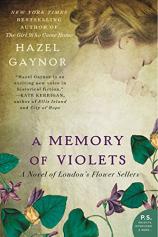Excerpt
Excerpt
A Memory of Violets: A Novel of London's Flower Sellers

PROLOGUE
London. March 1, 1876
Mammy once told me that all flowers are beautiful, but some are more beautiful than others. ‘Same with babies,’ she said, ‘cause I was after saying that little baby Rosie looked like a rotten old turnip, what with her face all purple and scrunched up. ‘All babies look like rotten old turnips at first,’ Mammy said. ‘She’ll be all smoothed out by Michaelmas. You wait and see.’
She was, too. All smoothed out. After turning into a real pretty little thing she was then, ‘specially with that red hair. Like the flames in the costers’ smudge pot fires.
‘Sure, there’s no denying the Irish in that one.’ That’s what Da said. Don’t think he ever spoke about Rosie again. Barely noticed her, other than to let a roar at her or give her a wallop when she was after bawling too much. Awful mean to little sister, so he was, so I gave Rosie all the love I could find in my heart, to try and make things nicer for her, like.
Truth be told, I loved little Rosie Flynn from the very first minute I set eyes on her - even with her squashed-up turnip face. I’d never had nothing of my own, not until little sister was born and then, there she was - my very own sister, what had lived. Not like them other poor babies what had been born all blue and quiet. Like wilted violets after the frosts, so they were. No use to nobody. But not little Rosie. Pink as a carnation she was, bawlin’ good n’ proper in her vegetable pallet cradle and there I was, smiling at her like a great eejit. Loved her to bits, so I did.
When Rosie was small, Mammy’d throw her into the shallow with the stock money and we’d head off to Covent Garden in the soot-black dark. You’ve to get to the Garden good ‘n early see - four or five o‘clock - so as to get the pick of the best blooms after the shop keepers have bought their stock. We’d leave our cold, stinking room at Rosemary Court and walk by the light of the gas lamps; Rosie’s little turnip face peeping out o’ the basket and Mammy striding along like a great ox. ‘Keep up will ye, Florrie Flynn,’ she’d shout over her shoulder. ‘For the love of God, it’ll be Christmas before we get there at this rate.’ And I’d gallop along behind, clinging to her skirts so as not to get lost, or snatched away by one of them bad men what takes little children and teaches them thievin’ and such - like them natty lads. Like a hurdy-gurdy machine, so I was, going up and down, up and down, my good leg dragging my bad one along as best it could. Awful painful it was, for me to walk. Wasn’t until the spring after Rosie was born that Mammy realised my leg wasn’t growing right ‘cause of the polio I’d had as a baby. I’ve had the crutch ever since.
While Mammy bought the stock for the day’s sellin’ - a shillin’ for a dozen bunches -I’d coo at Rosie and sing songs to make her smile. Mammy’d buy whatever was lookin’ the prettiest and smellin’ the sweetest. ‘It’s the sweetness what sells the flowers, Florrie, sure it is,’ she’d say. ‘The sweetness what sells ‘em.’ Most days, it’d be violets, primroses or moss-roses. We always did well on primroses and young moss-roses. Sometimes it would be stocks or wallflowers if they were in, or maybe pinks and carnations. I liked the springtime when Mammy sold the oranges with the flowers; the fresh smell of them oranges was something else. All in the shallow it would go, so as little Rosie was covered from head to toe in lovely, sweet blooms. Reckon she’d have stayed in there forever if she could. Better ‘an smelling that stinking sewer and them fish heads and cabbage leaves all rotten, and the flies buzzing round.
We’d sit then with the other flower sellers, round the columns at St. Paul’s Church, across from the covered market. Mammy an’ Maudie Brennan would chatter away about Ireland’s green fields and the smell of the turf fires while we tied up our bunches and buttonholes by candlelight. Mammy’d do the tying and I’d pass the blooms. We’d get the rush to tie ‘em with for nothing and add the leaves around the violets and primroses, then the paper. Mammy said I could make ten bunches of violets from nothing! I could too. Then we’d sell ‘em for a penny a bunch and I knew me an’ Rosie might get a penn’orth of pudding that day from the pudding shop on The Strand. Them great fat raisins never tasted so nice after a hard day’s selling, sure they didn’t.
Off we’d go then, Mammy, Rosie (in the basket) and me, hawking our flowers round the streets and at the railway stations and the theatres up the West End - they’re always good for trade - and the Opera House, what brings the ladies and gen’lemen out in their hundreds in the evenings.
‘Two bunches of violets,’ we’d cry. ‘Sweet violets.’ ‘Buy y’r primroses. Two bunches a-penny.’ ‘All a-blowin’, all a-growin’. That’s what you’d hear the sellers cry when the primroses were in and then you’d know it was spring for certain. And when the summer came to an end it’d be ‘Lavender – sweet lavender!’ and then the east wind’d start blowing for snow and the frosts’d come and the blooms’d wither up before you’d even sell a one of ‘em. That’s when we’d start sellin’ the ‘cresses. ‘Worter-creesss! ‘Worter-creesss!’ we’d cry, and you’d know that the winter’s arrived and then things’d get awful hard.
Freezing to make your fingers turn blue that water was, at the pump where we’d wash the ‘cresses. I’d start wailing with the cold, my feet all frozen against the cobbles. ‘Stop y’r bawlin’, Florrie Flynn,’ Mammy’d say, ‘and puff them ‘cresses out. Y’ve to make ‘em look bigger so as the ladies’ll buy ‘em.’ So I would stop bawlin’ and puff out the cresses and we’d sell those what weren’t frozen and then we’d go back to that stinking room in Rosemary Court. I’d sing little Rosie to sleep, her in the vegetable pallet and me on the bit o’ mattress on the floor. Miserable, so I was – cold and afraid and with an ache in my belly with the hunger. But when I saw Rosie’s little face smiling at me, I knew it would all be right come the morning, ‘cause things don’t seem so bad when someone smiles at you, sure they don’t.
But that were all before. Before the cholera came and took Mammy away.
I miss her, so I do. Maybe she couldn’t teach me to read nor write, but she taught me all the tricks of the market: how to gather the dropped walnuts for the fire, how to walk behind the fish barrows to catch a slippery herrin’ or two, how to tie the buttonholes and tussie-mussies. Taught me everything I know, so she did.
Things is different now, ‘cause it’s just Rosie an’ me does the sellin’, and we can’t go too far, what with me on my crutch and little sister to be mindin’ like I promised Mammy I would.
‘Oh, please buy my flowers, kind lady. Tuppence a bunch. Oh, please do.’ That’s what we cry.
Sometimes the ladies buy an extra buttonhole from Rosie, or give the price of two bunches for one, what with her being so small and thin looking. ‘A penny, my poor girl, here's three-halfpence for the bunch,' they say, and they always tell her what pretty, red hair she has and she smiles, even though she can’t see those pretty faces smiling back at her. Lives her life in the dark, so she does. Poor little Rosie.
When the rains come and the ladies ain’t out, or the fog comes down so thick it’ll choke ye, and when the frosts come and the flowers is all frozen, we don’t sell nothing. Them are the nights when we don’t go back to Rosemary Court, ‘cause I know that Da’ll beat me ‘til I’m lavender, for certain. So, me an’ Rosie sleep in a doorway, or under a market barrow, and my teeth ache with the cold and I hold Rosie’s frozen little hand in mine. We get as tight together as we can, so as not even so much as a rose petal could fit between us, and I remember my promise to Mammy and say a prayer that the flowers won’t be frozen the next day and that we might get a bit of meat in our bellies if we’re good girls.
And then we wait for the morning to come and the flowers to arrive.
Just me an’ Rosie. Me an’ little sister. Waiting in the dark.
‘Don’t let go, Rosie,’ I whisper. ‘Don’t let go.’
A Memory of Violets: A Novel of London's Flower Sellers
- Genres: Fiction, Historical Fiction
- paperback: 432 pages
- Publisher: William Morrow Paperbacks
- ISBN-10: 0062316893
- ISBN-13: 9780062316899








